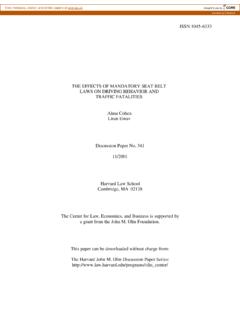Transcription of ISSN 1045-6333 HARVARD - CompensationStandards.com
1 issn 1045-6333 HARVARD JOHN M. OLIN CENTER FOR LAW, ECONOMICS, AND BUSINESS PAY WITHOUT PERFORMANCE: OVERVIEW OF THE ISSUES Lucian A. Bebchuk Jesse M. Fried Discussion Paper No 528 10/2005 HARVARD Law School Cambridge, MA 02138 This paper can be downloaded without charge from: The HARVARD John M. Olin Discussion Paper Series: The Social Science Research Network Electronic Paper Collection: This paper is also a discussion paper of the John M. Olin Center's Program on Corporate Governance Last revision: October 2005 Pay without Performance: Overview of the Issues Lucian A.
2 Bebchuk and Jesse M. Fried Abstract In a recent book, Pay without Performance: The Unfulfilled Promise of executive Compensation, we critique existing executive pay arrangements and the corporate governance processes producing them, and put forward proposals for improving both executive pay and corporate governance. This paper provides an overview of the main elements of our critique and proposals. We show that, under current legal arrangements, boards cannot be expected to contract at arm s length with the executives whose pay they set.
3 We discuss how managers influence can explain many features of the executive compensation landscape, including ones that researchers subscribing to the arm s length contracting view have long viewed as puzzling. We also explain how managerial influence can lead to inefficient arrangements that generate weak or even perverse incentives, as well as to arrangements that make the amount and performance-insensitivity of pay less transparent. Finally, we outline our proposals for improving the transparency of executive pay, the connection between pay and performance, and the accountability of corporate boards.
4 Keywords: Corporate governance, managers, shareholders, boards, directors, executive compensation, stock options, principal-agent problem, agency costs, rent extraction, disclosure, stealth compensation, compensation consultants, camouflage. JEL classification: D23, G32, G34, G38, J33, J44, K22, M14. William J. Friedman and Alicia Townsend Friedman Professor of Law, Economics, and Finance and Director of the Program on Corporate Governance, HARVARD Law School; Research Associate, National bureau of economic Research.
5 Professor of Law and Co-Director of the Berkeley Center for Law, Business and the Economy, Boalt Hall School of Law, University of California at Berkeley. This papers draws on our earlier work on executive compensation, especially our recent book, Pay without Performance: The Unfulfilled Promise of Executive Compensation ( HARVARD University Press, 2004). For financial support, we would like to thank the John M. Olin Center for Law, Economics, and Business and the Guggenheim, Lens, and Nathan Cummins Foundations (Bebchuk); and the Boalt Hall Fund and the Berkeley Committee on Research (Fried).
6 In judging whether Corporate America is serious about reforming itself, CEO pay remains the acid test. To date, the results aren t encouraging. Warren Buffett, letter to shareholders of Berkshire Hathaway, Inc., February 2004 In our recent book, Pay without Performance,1 and in several accompanying and subsequent papers,2 we seek to provide a full account of how managerial power and influence have shaped executive compensation in publicly-traded companies. Financial economists studying executive compensation have typically assumed that pay arrangements are produced by arm s-length contracting contracting between executives attempting to get the best possible deal for themselves and boards trying to get the best possible deal for shareholders.
7 This assumption has also been the basis for the corporate law rules governing the subject. We aim to show, however, that the pay-setting process in public companies has strayed far from the arm s-length model. Our analysis indicates that managerial power has played a key role in shaping executive pay. The pervasive role of managerial power can explain much of the contemporary landscape of executive compensation, including practices and patterns that have long puzzled financial economists. We also show that managerial influence over the design of pay arrangements has produced considerable distortions in these arrangements, resulting in costs to investors and the economy.
8 This influence has led to compensation schemes that weaken managers incentive to increase firm value and even create incentives to take actions that reduce long-term firm value. The dramatic rise in CEO pay during the last two decades has been the subject of much public criticism, which intensified following the corporate governance scandals that began erupting in late 2001. The wave of corporate scandals shook confidence in the performance of 1 Lucian A. Bebchuk & Jesse M. Fried, Pay Without Performance: The Unfulfilled Promise of Executive Compensation ( HARVARD University Press, 2004).
9 Earlier articles by us on which the book draws include Lucian A. Bebchuk, Jesse M. Fried & David I. Walker, Managerial Power and Rent Extraction in the Design of Executive Compensation, University of Chicago law Review 69 (2002): 751-846; and Lucian A. Bebchuk & Jesse M. Fried, Executive Compensation as an Agency Problem, Journal of Economic Perspectives 17 (2003): 71-92. 2 These studies include Lucian A. Bebchuk & Jesse M. Fried, Stealth Compensation via Retirement Benefits, Berkeley Business Law Journal 2 (2004): 291-325; Lucian A Bebchuk & Jesse M.
10 Fried, Executive Compensation at Fannie Mae: A Case Study of Perverse Incentives, Nonperformance Pay, and Camouflage, forthcoming, Journal of Corporation Law (2005); Lucian A. Bebchuk & Yaniv Grinstein, The Growth of Executive Pay, Oxford Review of Economic Policy 21 (2005): 282-303; Lucian A. Bebchuk & Robert Jackson, Jr., Putting Executive Pensions on the Radar Screen, HARVARD Olin Paper No. 507, forthcoming in Journal of Corporation Law (2005); and Lucian A. Bebchuk and Yaniv Grinstein, Executive Pay and Firm Size, Working Paper, HARVARD Law School and NBER (2005).










